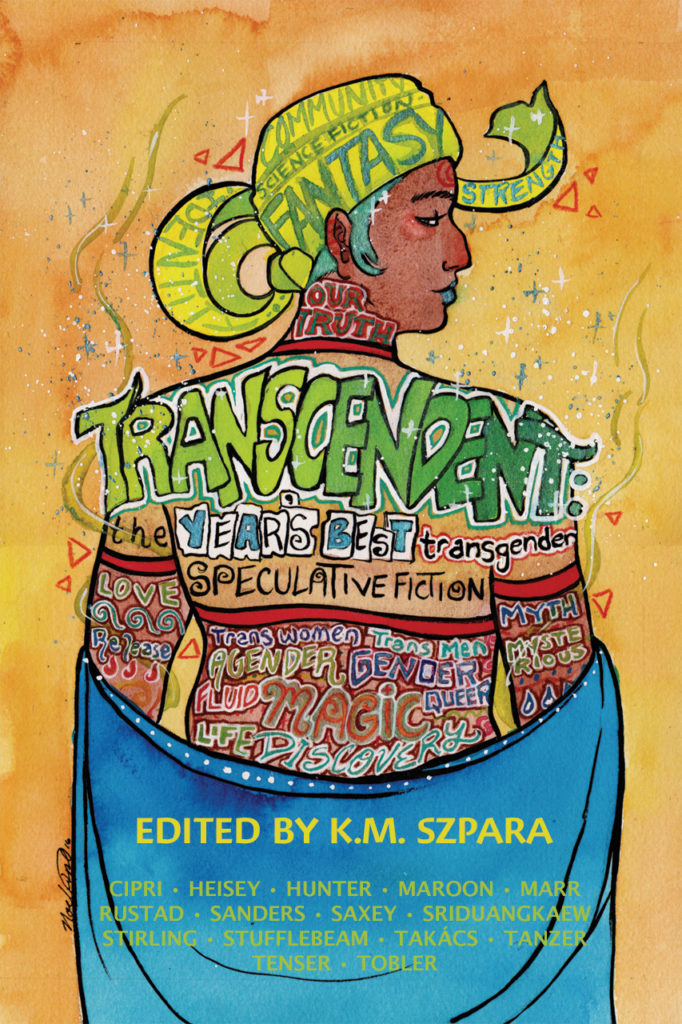In today’s “Sunday Shorts,” we’ll take a look at a couple of the stories from:
TITLE: Transcendent: The Year’s Best Transgender Speculative Fiction
EDITOR: K.M. Szpara
195 pages, Lethe Press, paperback and e-book formats, ISBN 9781590216170
DESCRIPTION (from the back cover): There are fantastical stories with actual transgender characters, some for whom that is central and others for whom that isn’t. And there are stories without transgender characters, but with metaphors and symbolism in their place, genuine expressions of self through such speculative fiction tropes as shapeshifting and programming. Transgender individuals see themselves in transformative characters, those outsiders, before seeing themselves as human protagonists. Those feelings are still valid. But though the stories involve transformation and outsiders, sometimes the change is one of self-realization. This anthology will be a welcome read for those who are ready to transcend gender through the lens of science fiction, fantasy, and other works of imaginative fiction.
MY RATING: FIVE out of FIVE STARS
MY THOUGHTS: There are sixteen stories in the inaugural edition of Transcendent (the sophomore volume will be out later in 2017, edited by Bogi Takács). They are all roundly wonderful, entertaining and instructive in so many ways. But the purpose of “Sunday Shorts” is to focus on a story or two rather than reviewing the entire book. So:
“The Shape of my Name” by Nino Cipri starts the collection. It’s a time-travel story in which the ability to time-travel follows essentially the matrilineal lines of a family, But what happens to that process when a child born female identifies as male? The main character navigates his relationship with his mother, father, distant uncle and distant cousin, all complicated by the vagaries of the way time-travel works for this particular family. Cipri’s use of sensory detail at the start of each main section (“2076 smells like antiseptic gauze,” “1954 tastes like Kellogg’s Rice Krispies in fresh milk”) helps ground the reader in familiarity before spinning off into details of time-travel and cause-and-effect. I enjoyed the story so much that I read it twice through back-to-back, and then again when I was done with the anthology. I can safely say the time-travel rules are clearly consistent and intriguingly parceled out to the reader. You may not understand how they work at the start of the story, but you will at the end. The voice of the main character is assured and confident but still recovering from old wounds and slights, especially in relation to his mother. That relationship motivates all of the time-travel the main character does, in search of answers and closure – something I’m sure all of us who travel in linear time are also always looking for. This is a fantastic start to a great anthology.
“The Need For Overwhelming Sensation” by Bogi Takács takes place in a science fiction universe of political intrigue and space-travel driven by the energy generated by intense emotion. (If the author has other stories set in this same universe, I haven’t read them but would gladly do so. I really need to seek them out.) While the world-building is immersive (surrounding the gone-awry negotiations of the planet Ohander to join the Alliance), it’s the character interactions that pulled me in and kept me reading. The story, to me, drives home the point that even the most open-minded and accepting of us have our blind-spots and walls. In this case, it’s the unwillingness of a politician named Miran Anyuwe (pronoun: they), who clearly has no problem with trans* and gender-fluid fellow space travelers, to accept the relationship of the Master and crew-member of the ship which Anyuwe is trying to escape danger on. The interaction between Miran Anyuwe, Master Sanre, and the narrator comes to a head at a pivotal moment over the way in which the narrator generates the necessary energy to power their ship, plunging them all into increasing danger as the story builds to its conclusion. I don’t want to spoil the twists and turns of the story any more than that – but I was engaged in the story from first word to last.
“Treasure Acre” by Everett Maroon is one of the shortest pieces in the book, and hangs on the classic question: If you could go back and change your past to make it easier to be the person you want to be in the present, would you? The man and young girl in the story are digging in her mother’s backyard for a treasure box the girl buried when even younger, the box holding a key to the girl’s future and the man’s past. The story is wistful, nostalgic and full of questions and answers in a scant four pages, and put a smile on my face at the end, while making me wonder how I’d handle the same situation if it was presented to me.
Those are just three out of the sixteen stories in TRANSCENDENT. The rest run the gamut of speculative fiction, from SF to fantasy to horror, by authors I was familiar with (Bonnie Jo Stufflebeam, E. Catherine Tobler (one of her Circus stories), A. Merc Rustad, Benjanun Sriduangkaew, and Molly Tanzer (a wonderful Lovecraftian story), and authors to whom this was my first exposure (Holly Heisy, Jack Hollis Marr, B R Sanders, E. Saxey, Margarita Tenser, Alexis A. Hunter and Penny Stirling). An anthology well worth seeking out if you haven’t already, and to which I’m eagerly awaiting the next installment.
